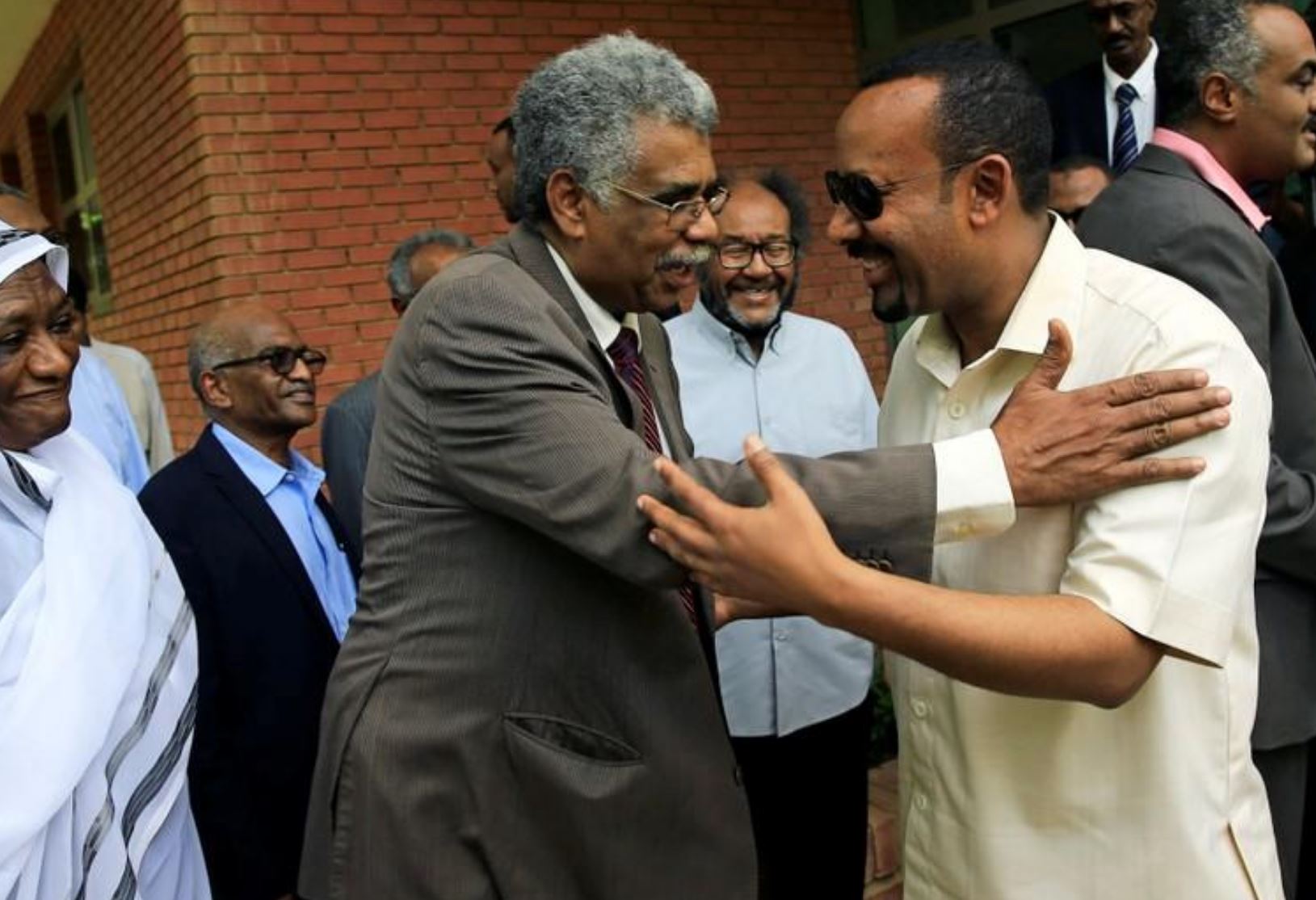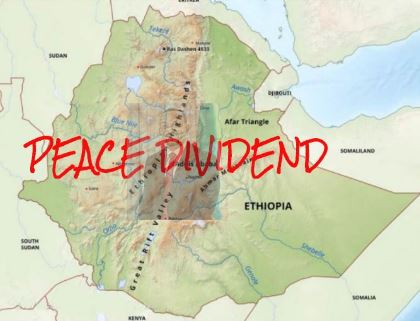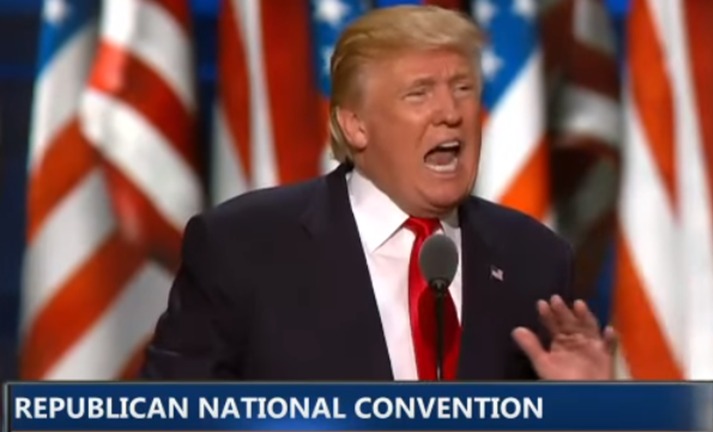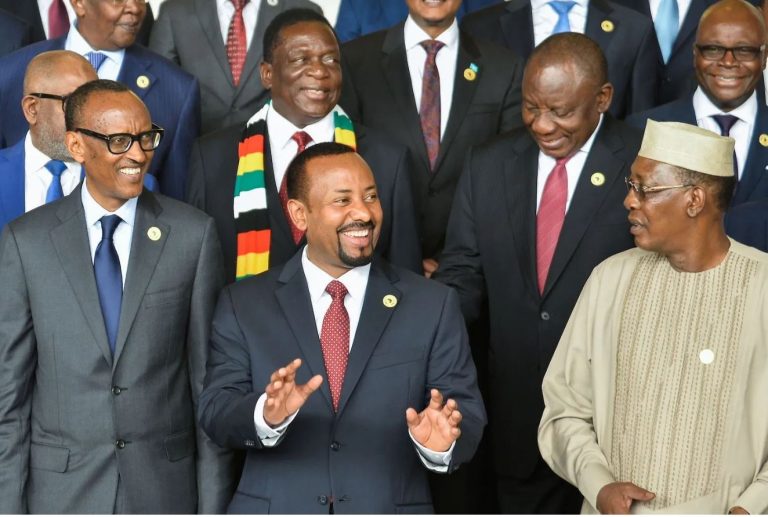Abiy Ahmed, “Africa’s First Responder?”
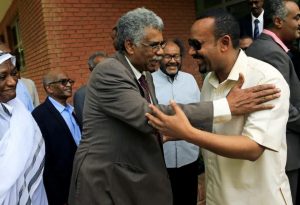 The phrase “first responder” refers to a person, often with specialized training, who is the first to arrive and aid at the scene of an emergency or a disaster.
The phrase “first responder” refers to a person, often with specialized training, who is the first to arrive and aid at the scene of an emergency or a disaster.
On June 3, 2019, there was more than an emergency in the Sudan. There was a disaster.
Paramilitary Rapid Support Forces under the command and control of the ruling Sudanese junta indiscriminately fired into crowds of unarmed prodemocracy street demonstrators, killing 118, wounding over 500 and arresting scores more.
The African Union condemned the junta’s use of indiscriminate deadly force and took preliminary steps in preparation for serious sanctions against the Sudanese military regime. U.N. Secretary-General António Guterres also strongly condemned the junta’s excessive use of force against protesters.
On June 7, Prime Minister Abiy Ahmed was the first responder to show up at the scene of the crime in Karthoum.
He went to Karthoum as opposition leaders mulled over the necessity of declaring a parallel civilian government and seeking international recognition.
The Sudanese opposition accepted PM Abiy as mediator and held meetings with him as did the leaders of the junta self-styled as the Transitional Military Council (TMC).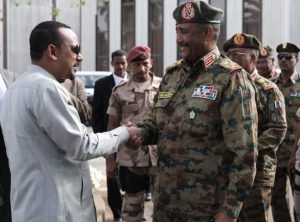
It was reported that three opposition leaders had been detained by Sudan’s junta following discussion with PM Abiy but were released a few days later.
On June 11, 2019, it was announced PM Abiy had brokered a deal between the opposition and the TMC which could help transition Sudan to democracy.
Accordingly, “Sudan’s opposition plans to nominate eight members of a transitional council and name a prominent economist to head a government.”
 In an amazing turn of events, PM Abiy also successfully negotiated the release of dozens of Ethiopian prisoners held in Sudanese jails and brought back a whole bunch of them on his plane.
In an amazing turn of events, PM Abiy also successfully negotiated the release of dozens of Ethiopian prisoners held in Sudanese jails and brought back a whole bunch of them on his plane.
The released prisoners were effusive in their praise and gratitude for PM Abiy.
Sudan is not the first instance in which PM Abiy served as a first responder.
Within weeks after taking office, PM Abiy became a first responder and resolved the two-decades long deadlock between Ethiopia and Eritrea.
For nearly two decades, the U.N., the AU and other diplomatic efforts had failed to bring peace between the two countries.
I was a witness and present in Zalambessa and Bure when the border between Ethiopia and Eritrea was opened on September 11, 2018.
PM Abiy was the first responder in resolving the decades of animosity between Somalia and Eritrea helping the two countries establish diplomatic ties.
PM Abiy was the first responder in the easing of tensions between Eritrea and Djibouti.
PM Abiy was the first responder in mediating a maritime border issue on the Indian Ocean between Kenya and Somalia.
PM Abiy was the first responder mediating peaceful conflict resolution between the warring faction leaders in South Sudan.
Abiy Ahmed broke the African mold
There is no question PM Abiy broke the African leadership mold that has been in use since African “independence” in the early 1960s.
I have spent many decades studying African “leaders”.
For the past seven decades, the vast majority of African leaders have been dictators, autocrats, authoritarians, tyrants, oligarchs and despots.
I even coined a set of descriptive labels for a particularly virulent breed of African dictators.
Thugtators. Thugtatorships. Thugogracies. Thugmocracies.
In May 2011, I posted a commentary in the Huffington Post entitled, “ Thugtatorship: The Highest Stage of African Dictatorship.”
I wrote:
If democracy is government of the people, by the people and for the people, a thugocracy is a government of thieves, for thieves, by thieves. Simply stated, a thugtatorship is rule by a gang of thieves and robbers (thugs) in designer suits. It is becoming crystal clear that much of Africa today is a thugocracy privately managed and operated for the exclusive benefit of bloodthirsty thugtators…
African thugtators cling to power to operate sophisticated criminal business enterprises to loot their national treasuries and resources. These African “leaders” are actually “godfathers” or heads of criminal families. Just like any organized criminal enterprise, African thugtators use their party apparatuses, bureaucracies, military and police forces to maintain and perpetuate their corrupt financial empires.
In my June 2015 commentary entitled, “Ethiopian Thugmocracy”, following the elektion in which the Tigrean People’s Liberation Front claimed to have won 100 percent of the seats in parliament, I wrote:
When thugs are “elected” to political office, they become thugmocrats. A thugmocracy is a form of “government” in which the facade of representative electoral democracy is used to maintain and perpetuate the iron rule of a bunch of bush thugs who use state power to line their pockets and their cronies’ pockets.
Figuring out Abiy Ahmed
Ethiopians are trying to figure out Abiy Ahmed.
Indeed, the world is trying to figure out Abiy Ahmed and how he does what he does.
The Financial Times opined Abiy Ahmed “may be the most popular politician in Africa” and called him “Ethiopia’s Mandela”.
The New York Times asserted Abiy Ahmed is the “most closely watched leader in Africa.”
CNN has tried to explain “Why Ethiopians believe their new prime minister is a prophet.”
The Economist tried to figure out why “Ethiopians are going wild for Abiy Ahmed.”
Al Jazeera wondered if Abiy Ahmed is the real thing: “Are Ethiopians blinded by Abiymania?”
The Italian Institute for International Political Studies declared, “Abiy Ahmed is the Leader to Watch in 2019” and added “he is the bravest and most innovative leader in Africa today.”
In August 2018, Black Star News declared, “Dr. Abiy Ahmed is a legitimate Nobel Peace Prize candidate.” Herman Cohen, former U.S. Assistant Secretary for African Affairs agrees.
The Peace Research Institute Oslo regarded as the world’s “oldest and most prominent peace research center” ranked PM Abiy as the top candidate for the 2019 Nobel Peace Prize.
Everybody’s head is spinning trying to figure him out. All of this for a man 43 years of age and in office 14 months!
Are we witnessing an African Spring?
In 2011, we witnessed the “Winter of Arab” discontent made glorious by an “Arab Spring” followed by an increasingly hot “Arab Summer” and deeply troubled “Arab Fall”.
In my January 2012 commentary “An ‘African Spring’ in 2012?”, I asked whether an “Ethiopian Tsedey” (Spring) was in the air.
In August 2012, it became clear Spring had sprung in Ethiopia.
Ethiopians heaved a sigh of relief.
To paraphrase Shakespeare, the “21 year winter of our discontent would soon turn to glorious summer, and all the clouds that lour’d upon our house, In the deep bosom of the ocean buried.”
But it took until April 2018 for the flowers of the Ethiopian Spring to bloom.
In 2019, the political seasons are changing all over Africa.
The people are becoming more assertive and demanding good governance.
The days of Africa’s “Big Men” and kleptocratic dictators are numbered.
The numbers do not favor the old dictators. They will soon be consigned to the trash bin of history.
“About 41% of the people in the continent are below 15 years old while another 19% are youth between 15 and 24 years old.”
The choice is clear.
Africa’s youth will be innovators and wealth and income generators and on the frontlines in the war against poverty, disease and illiteracy or they will be the slow burning fuse on the African powder keg.
I believe Ethiopia is the sign of the times for the rest of Africa.
Young people in Africa fed up with dictators who jail, torture and muzzle them shall rise in defiance and resistance.
They may follow the example of Ethiopia’s youth who fought with nothing more than civil disobedience and nonviolent resistance to bring down one of the cruelest, barbarous and bloodthirsty dictatorships in modern African history.
The real question is how to bring about good governance and political accountability without the usual violence and destruction.
Medemer as good governance in motion
PM Abiy has spoken about his idea of Medemer over the past year.
I have expounded on the concept of “Medemer” on various occasions.
“Medemer” is not a theory but simply the practice of the principle of inclusiveness, good governance and political accountability.
As I explained in my March 2019 commentary, “The Praxis of Medemer in the Horn of Africa”, the only choice facing Africa is the one eloquently contained in Dr. Martin Luther King’s maxim, “We must all learn to live together as brothers or we will all perish together as fools.”
To borrow from Plato’s “Republic”, African leaders can strive to create a ship of state and promote peace and prosperity for their people or suffer the wrath of the people and perish as a ship of fools.
For decades, the Horn countries (Ethiopia, Eritrea, Somalia, Kenya, Djibouti, South Sudan and Uganda) have chosen the path of perishing as fools.
Ethiopia and Eritrea fought a needless war in the name of “national pride” and “territorial integrity” between 1998-2000, which resulted in the deaths of as many as 100,000 people, displacement of up to one million and diversion of much needed resources to buy bullets instead of butter.
Since the creation of South Sudan in 2011, ethnic rivalry between factional leaders has resulted in the deaths of thousands of innocent people.
No African nation can live as an island separated from its neighbors.
African countries are tied together in a single garment of destiny, caught in an inescapable network of mutuality.
PM Abiy says the spillover effect of the conflict and instability in the Sudan directly affects Ethiopia.
What happens in each Horn country affects the others. War in one country threatens the peace in the other. Peace and democracy in one country become examples for the continent.
The fact of the matter is the Horn of Africa today faces myriad issues ranging from grinding poverty, disease and ignorance to large scale population displacements and population explosion and endless strings of deadly conflicts.
PM Abiy’s application of Medemer aims to solve these problems in the Horn through the creation of an “economic bloc (with Eritrea, Djibouti, the Somalias, and Sudan) fueled by the competition between Gulf and Chinese money, or to re-engineer the Intergovernmental Authority on Development.”
The formula for peace and prosperity in the Horn or in Africa in general is not complicated. As Mandela said, “If you want to make peace with your enemy, you have to work with your enemy. Then he becomes your partner.”
We need a nation/continent of first responders
There are some benighted individuals mouthing off about how PM Abiy is spending so much time trying to bring peace in Africa and the Middle East while there is so much conflict among groups, factions, organizations and parties in Ethiopia.
They point an accusatory finger at PM Abiy and carp, “Why doesn’t he rove around Ethiopia brokering peace in every beer (tej/tella) hall, neighborhood, town and college. The country is going to hell in a hand basket.”
What these benighted souls fail to see in their narrow lenses is that as they point an accusatory finger at PM Abiy, three fingers are pointing squarely at them.
They never stop to ask, “What is my personal responsibility to broker peace in my neighborhood?”
I pity these myopic twits.
Ethiopia cannot be at peace when Ethiopia’s neighbor’s are at war.
War, conflict, refugees, famine, etc., know no borders.
In 2019, some 400,000 refugees from South Sudan settled in the Gambela region of Ethiopia. “Ethiopia has been praised for its open door policy to refugees feeling war-torn South Sudan.”
How many more millions of refugees can Ethiopia accommodate?
When Sudan is at war, Ethiopia takes care of their refugees.
Naysayers and nitwits aside, PM Abiy must not be the only first responder in Ethiopia or in Africa.
PM Abiy must not be the only one who shows up at the scene of a crime and work to prevent things from getting out of hand.
Every Ethiopian man, woman and child can and must be a first responder in their own right in their neighborhoods, hamlets, towns, cities, regions, schools, universities, churches, mosques, etc,.
It does not require special training as a first responder to stand up and speak up when Ethiopians are displaced, denied justice, mistreated and their human rights violated.
Last week, a student at Aksum University was killed in what is reported to be a bias-based crime. A week earlier a similar incident occurred at Debremarkos University.
Where were the university first responders then?
Perhaps they were expecting PM Abiy to come to campus and do first responding for them?
When Ethiopians were displaced in West Guji and Gedeo, Benishangul Gumuz, where were the first responders?
I don’t know but I saw a lot of first finger pointers unaware three fingers are pointing at them.
PM Abiy cannot be at all places at the same time. He does not have a magic wand to wave and make everything alright.
But 110 million Ethiopians can wave their hands and make everything alright.
When 110 million Ethiopians put their hands together, they form an unbreakable bond called “Medemer”.
That is the only viable principle to save Ethiopia and Africa. In Ethiopia and Africa, Medemer means united we stand, divided we fall and perish like fools.
Just like the fingers on the hand, “Medemer” means all for one and one for all.
Medemer means all of Africa is bound in a single garment of destiny.
When we practice “Medemer” as first responders, we will have achieved the ultimate in human solidarity.
In the spirit of Dr. King, as first responders in Medemer, we will walk together, work together, go to jail together, celebrate together, cry together, laugh together, pray together, sing together, and live together in peace until that day when all God’s children – Amhara, Oromo, Tigray, Somali, Gurage, Wolayita, Sidama, Afar and the other 75 or more groups of the Ethiopian family — will rejoice in one common band of humanity.
It is folly to think only one mortal man has the responsibility and ability to deal with the ills of Ethiopia and bring solutions.
Ethiopia belongs to all its people. With ownership comes responsibility and a commitment to tireless diligence.
To paraphrase Shakespeare:
All Ethiopia’s a stage,
And all the men and women merely players;
They have their exits and their entrances…
Or as PM Abiy says Ethiopians have a choice of leaving their fingerprints in the work they do for coming generations or kick up dust in the face of this generation and become dust themselves and are forgotten.
Therefore, ask not what Abiy Ahmed can do for Ethiopia as a first responder, ask what you can do to respond first before Abiy Ahmed and make Ethiopia a fair, just and peaceful society.
Be an Ethiopian First Responder. Be an African First Responder.

